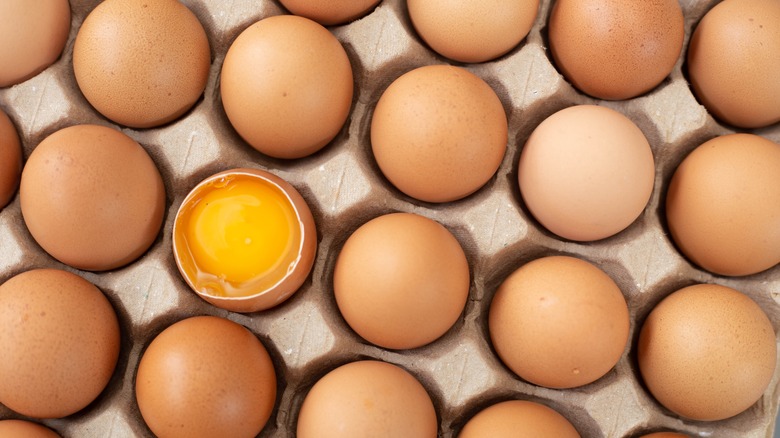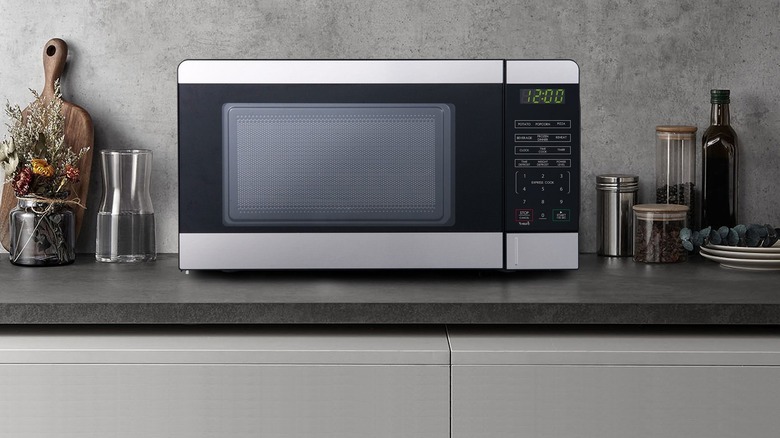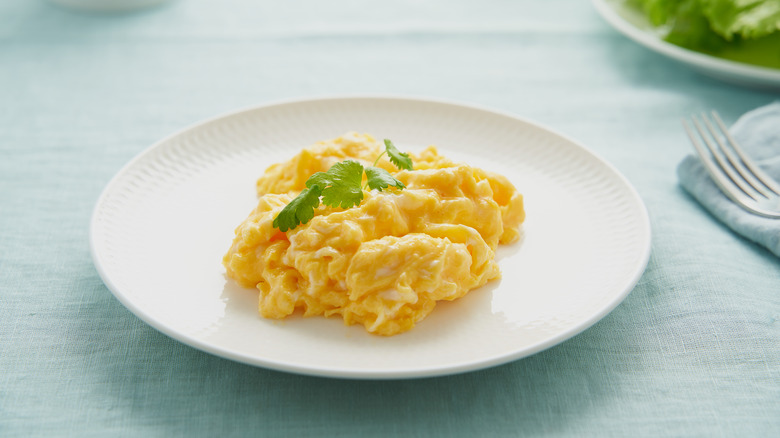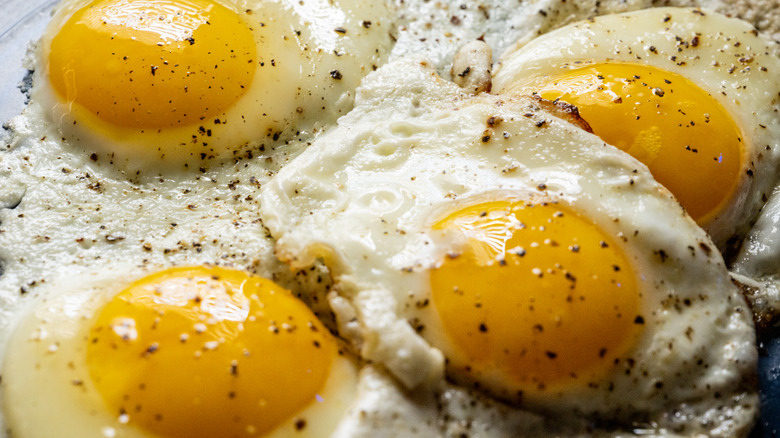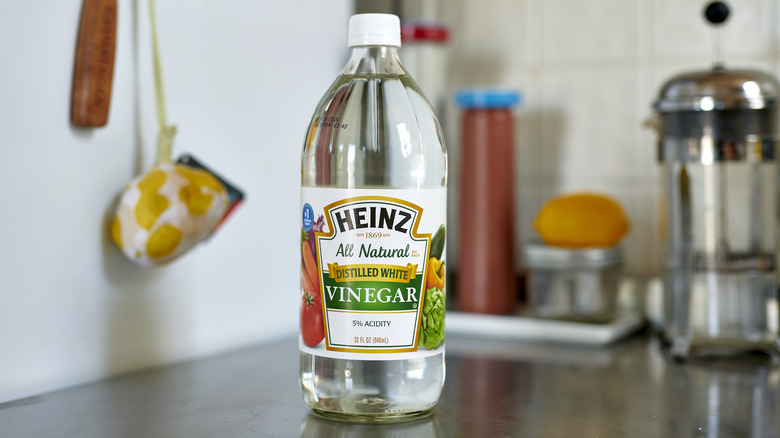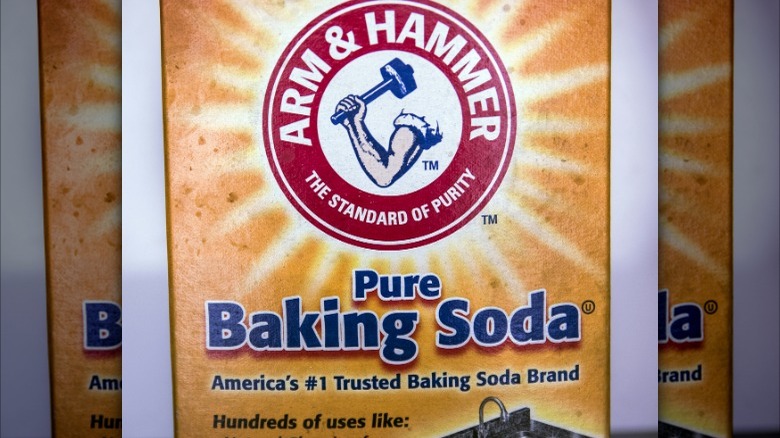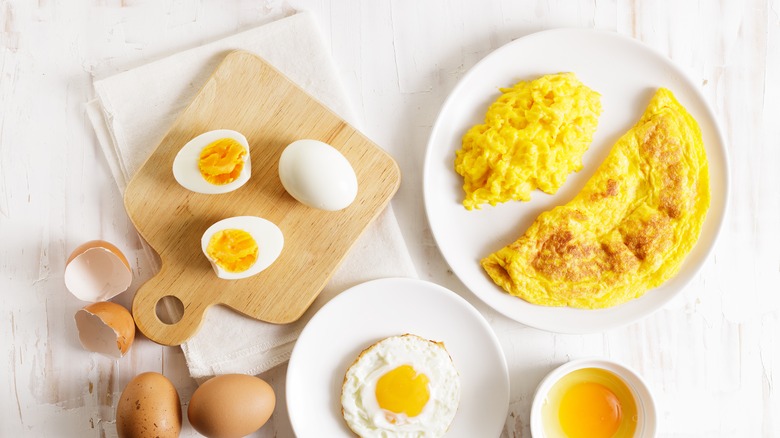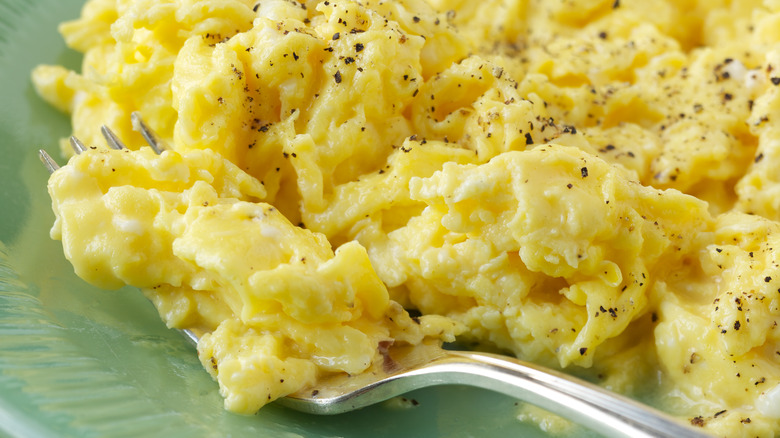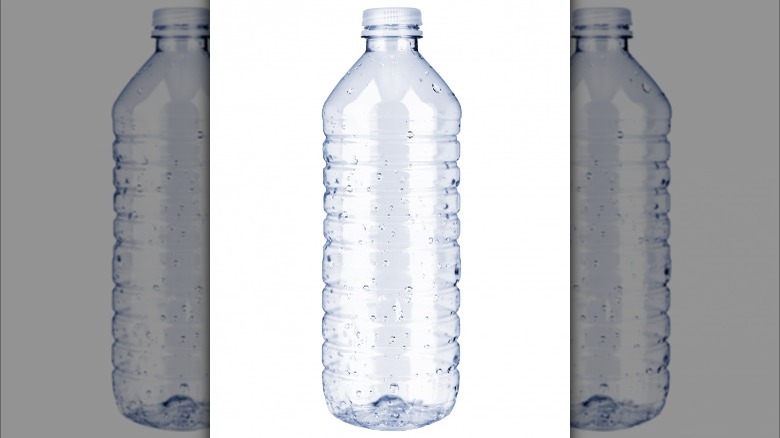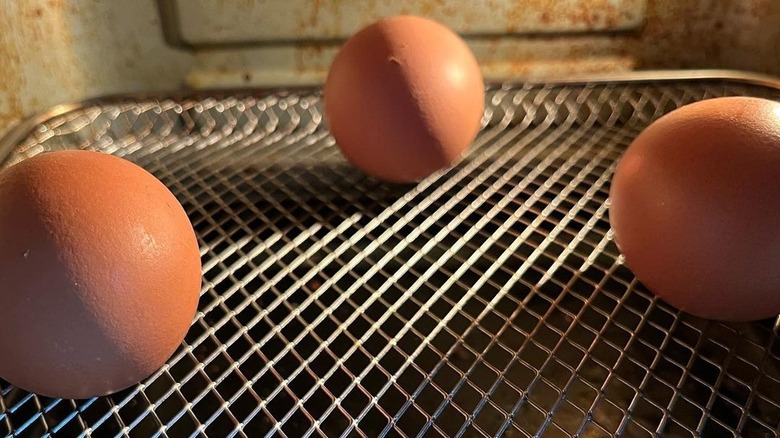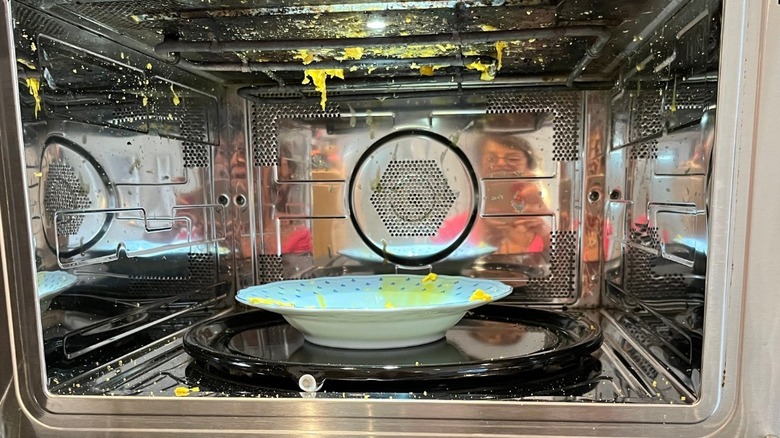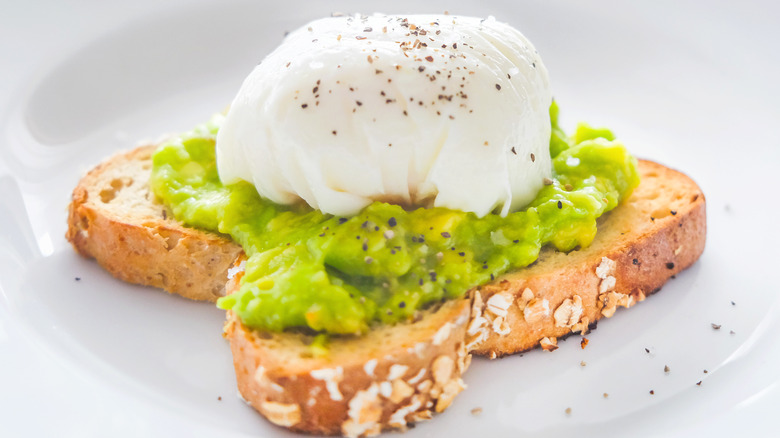Egg Hacks That Need To Be Removed From The Kitchen
Although eggs are among the first foods novice home cooks learn to prepare, they're also among the last that seasoned cooks master — who among us hasn't flubbed an omelet flip or battled a hard-boiled egg that refused to let go of its shell? Because they manage to be both basic and baffling, a whole body of lore has developed around the art of egg cookery. Some of this is actually sound — yes, raw eggs that sink when placed in water are fresher than those that float. But some of this lore is just that: popular legend.
With the rise of social media, a whole new wave of egg tips and hacks has emerged and captured the imagination of curious cooks. We know, of course, not to trust every video we see online and that a lot of so-called viral food hacks are shameless hoaxes. But we still can't help wondering about some of the egg hacks; they look pretty cool, but are they too good to be true? Alas, many of them are. So save yourself a bunch of eggs (and a lot of time) and avoid these wasteful (and occasionally dangerous) hacks.
Making poached eggs in the microwave
For many cooks, poaching eggs is stressful and frustrating. Either the eggs break apart in the water or upon removal, or you end up with weird jellyfish-shaped blobs, complete with tentacles. It's no wonder so many of us decamp to our favorite brunch spot whenever a craving for poached eggs hits. Sure, it's more expensive, but it beats choking down failed home-poached eggs served up with a side of self-loathing.
Then along came a solution some considered a miracle: poaching eggs in the microwave. All you need to do is fill a microwave-safe cup or mug with water, crack in an egg, cook on high for a minute, and out comes a perfectly poached egg. This hack went big, spawning thousands of videos and online articles. But there was one serious catch: It's fantastically dangerous.
Numerous people have been seriously burned when the eggs literally blew up in their faces. In 2019, a woman got second-degree burns and was nearly blinded when she opened the microwave and the egg exploded. In 2021, a man who said he'd poached eggs in the microwave "100 million times before" was also seriously burned when his egg exploded (via New York Post). Such accidents occur because microwaves, unlike stoves and ovens, heat eggs from the inside out, making them more likely to explode. Ultimately, this makes microwaving eggs an inherently risky proposition.
Scrambling an egg in its shell
One of the fun things about eggs is each one can potentially hold a surprise — you may crack one open and find two yolks instead of one. And you can surprise and delight your friends by filling clean, empty eggshells with Jello or confetti. In the same spirit, another egg hack emerged — making "golden eggs," or eggs scrambled while still in the shell.
Like confetti and Jello eggs, this looks like a fun project to do with kids: Put a raw egg in the toe of a stocking and swing it around vigorously in circles for several minutes, then cook it like a regular hard-boiled egg. In principle, all the swinging around will break the yolk and mix it with the white, resulting in a solid yellow cooked egg.
But while a lot of online videos show perfect, uniformly yellow eggs, many people have found that no matter how much time they spend flinging their eggs around, the yolk remains stubbornly intact. One Quora commenter recalled shaking their egg vigorously "rotating on both the long and short axis" for over 12 minutes, and still ended up with a regular-looking hard-boiled egg. The only difference? "It was probably the toughest egg I have ever peeled in my life," they wrote.
Frying eggs on parchment paper
One of the least enjoyable parts of cooking eggs is cleaning up. As you probably know from experience, eggs can be a real drag to scrape off, sticking stubbornly to the bottom of a pan. You can avoid this problem by using a nonstick pan or by greasing it generously. Keep in mind that you'll likely end up with greasy eggs and definitely have a greasy pan to clean out.
Once again, the internet came to the rescue with a novel solution: Line your pan with parchment paper. Just heat up the pan, lay down some parchment, and crack in your eggs — you won't need any oil and there's no cleanup, either. It sounds good in principle; you save on cleanup time and a bunch of calories. But does it taste any good?
The result is a cooked egg that slides easily onto your plate, but it doesn't have the appealing texture of a standard fried egg. The consistency is slightly dry and the egg may even develop unappealing brown spots. If you like your fried eggs with crispy edges, that's not going to happen here — even if you choose to add a bit of fat for flavor and browning. Moreover, if you use a gas stove, you also run the risk of setting the paper on fire. We guarantee that will be an even bigger mess to clean up.
Adding vinegar to boiling water for easy-peeling eggs
Hard-boiled eggs seem like one of the easiest things in the world to make; just set a timer, boil the eggs, and wait. Getting them out of their shells, however, is another matter. You may have found that at times your eggs slide right out, whereas in other cases the shells cling stubbornly, tearing out jagged chunks of egg white when you try to pull them off. Per Murphy's Law, this always happens on the very occasions when you need your eggs to look perfect — like when you're making a big batch of deviled eggs for a party.
A number of common hacks are supposed to solve this problem, such as adding vinegar to the water before boiling the eggs. Since eggshells are composed of calcium carbonate, vinegar should cause them to break down, facilitating their removal. But while adding vinegar won't make things any worse, it's questionable whether it will make peeling your eggs any easier. Test results are varied, but eggs boiled in plain water are often a little easier to peel than those boiled with vinegar too. You might want to save the vinegar for something else and skip this hack.
Adding baking soda to boiling water to make eggs easier to peel
Intractable problems invite multiple solutions, and creative cooks have approached the egg-peeling problem from a number of angles. Adding acid (such as vinegar) to the cooking water is theoretically supposed to weaken the shell, making it easier to peel. But the opposite approach – making the cooking water more alkaline by adding baking soda — has its fans too. Baking soda is thought to make the whites more alkaline, which is supposed to help separate them from the shell's inner membrane.
Similar to vinegar, baking soda doesn't harm your eggs, and one test found that baking soda-boiled eggs do indeed peel easily. However, the same test found that an initial batch of baking soda-boiled eggs cooked on a weak burner stuck stubbornly to their shells. It was the second batch of eggs, cooked over higher heat on a more powerful burner, that slipped easily out of their shells. Rather than adding ingredients to the water, an even better way to ensure easy egg peeling is to make sure the water is at a full boil before adding the eggs.
Making mini fried eggs from frozen eggs
There's something beguiling about miniature food. Maybe it charms us because it reminds us of the plastic play food from childhood, or maybe it's the fun of being able to consume an entire cake, pie, or three-course meal in a single bite. And for the crafty cooks among us, there's the creativity involved in actually making it. If you've tried your hand at crafting miniature food, you've probably heard of tiny fried eggs. Simply freeze a whole egg, peel off the shell, cut the frozen egg crosswise into slices, and fry them– the result is super cute.
The only catch is it's not very safe. The U.S. Department of Agriculture warns against freezing eggs in their shells. The change of state causes the liquid inside the egg to expand, which puts pressure on the shell and can lead it to crack. Even if the cracks are too small to be visible, they expose the inside of the egg to air and bacteria, which can contaminate even a fully frozen egg, according to Healthline. The subsequent cooking won't be enough to kill off some foodborne pathogens, especially if you like your yolks a bit runny. So although it's cute, this hack is not worth the risk, especially if you plan to feed the tiny eggs to children.
Scrambling eggs with sparkling wine or seltzer to make them fluffier
When it comes to defining the perfect scrambled eggs, there are varying schools of thought. For some, the best scrambles are soft, dense, and creamy; others enjoy firmer curds that can stand up to hearty add-ins; and others dream of waking up to a plate of light and fluffy eggs. If you're a fan of the latter, you may have heard about an intriguing hack: Mixing sparkling water or sparkling wine into your eggs to aerate them and make them even fluffier.
The thought of adding Champagne to your breakfast eggs sounds decadently appealing. And it's not hard to do — just swap out the milk you'd normally pour in for sparkling water or wine, and cook your eggs as per usual. Since sparkling wine is a natural partner for brunch eggs, wouldn't it be even better in your eggs? Not really.
One test found that sparkling water just made the eggs wetter, softer, and not particularly fluffier. In addition, the yolks and whites unexpectedly separated. While sparkling wine is a great foil for the rich taste of eggs, when it's actually combined with them, it lends an oddly sweet taste that some might find unpleasant.
Separating eggs with a plastic bottle
For novice cooks and bakers, separating eggs can be one of the most intimidating skills to learn. Traditionally, it's done by cracking the egg and carefully moving the yolk between the two shell halves to pour off the whites before placing the yolk in a separate bowl. A lot can go wrong; eggshell shards can get into the eggs, or the jagged edges of the shell can pierce the yolk, irreversibly mixing it into the whites. And if you're making meringue, which requires whites without a trace of yolk, you have to start over.
A clever-sounding hack promises to end your egg-separating anxiety: Crack whole eggs into a bowl and use a soft plastic soda bottle to pluck each yolk cleanly away from the whites. To do this, squeeze the air out of a clean plastic bottle, place the mouth of the bottle over each yolk, and use the bottle as a makeshift siphon. Weirdly enough, it actually works (though you're stuck with the fussy task of cleaning eggs out of a plastic bottle).
A simpler method is to just crack your eggs into a bowl and gently lift each yolk out with your hands, letting the whites drain between your fingers. If you're embarrassed to try this because it sounds like a hack for the preschool set, rest easy: This simple method is endorsed by no less than master French chef Jacques Pépin.
Making boiled eggs in an air fryer
We get it. Air fryers are the "it" appliance right now, and if you're a serious cook and don't have one, you've either been living under a rock or are engaged in a conscious act of resistance. There's no denying the appliance is useful; being able to get food good and crispy without spattering hot oil everywhere is a godsend. But as the saying goes, if you're a hammer, everything looks like a nail — and if you're an air fryer convert, it's tempting to want to cook everything you eat in it, including eggs.
A popular hack making the rounds is to make "boiled" eggs in your air fryer without actually boiling them. Fans of this method claim it's foolproof. Just set the timer and you end up with perfect eggs, cooked to your exact desired degree of doneness, every time. Critics, however, have one question: Why? Is it really necessary to pull out a separate appliance to make something as basic as a boiled egg? And is it really any easier, faster, or better than setting a timer on a pot of boiling water?
Cooking whole eggs in the microwave
Eggs and microwaves are a problematic combination. We all love a clever shortcut, and the internet is crowded with videos extolling the ease of cooking eggs in the microwave — it's supposed to be fast, easy, and mess-free. But all is not what it seems, and the trend of poaching eggs in the microwave, for example, has landed several people in the emergency room with serious burns.
An even more tempting — and equally ill-advised — hack is cooking whole eggs in the microwave. It would be really cool if it worked; you'd be able to have a cooked egg in seconds with no pots, pans, or utensils needed. But alas, if something sounds too good to be true it probably is, and this is definitely the case when it comes to cooking a whole egg in the microwave.
Microwaves work by heating food from the inside out, unlike conventional cooking which occurs in the reverse fashion. So as your egg cooks in the microwave, the interior heats first and generates steam, which will expand rapidly and cause the egg to explode. On the upside, your egg will explode before it has a chance to hit your face. On the downside, you will be stuck with a serious mess to clean up.
Making a whirlpool in cooking water for poached eggs
The ideal poached egg is a perfectly smooth orb, firm on the outside and tender on the inside. Making it sounds easy on paper: Just crack an egg, slip it into a pot of simmering water, and wait. But as many of us know from experience, eggs have minds of their own, and the result can be flat and blob-like or have odd white fringes hanging on the sides.
Among the slew of hacks that purportedly keep poached eggs nice and smooth, swirling the cooking water into a whirlpool and then pouring the egg into the spinning vortex is common. The spinning action supposedly keeps the egg together and forces all the stringy bits to wrap themselves around it, ensuring the outcome is a compact orb.
Not only does this idea not work, but it also restricts you to poaching only one egg at a time, which isn't really practical if you're cooking for a crowd. A far less labor-intensive — and foolproof — method of poaching eggs is to drop your eggs (cracked straight from the refrigerator) into a shallow pan of simmering water, cover the pan, and turn off the heat. In 3 to 5 minutes, your perfect poached eggs will be ready. Any fringy bits can be simply trimmed off before serving.
